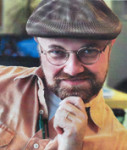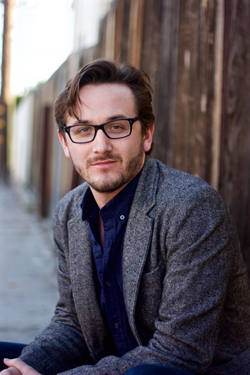By Eric George Tauber

 SAN DIEGO — Joshua Harmon’s Bad Jews is coming to the Cygnet Theatre in Old Town, Jan 12-Feb 12, 2017. It’s not a diatribe against us. It’s about us, about the tensions and divisions within the tribe that pit us against each other. I sat down and spoke with the director, Rob Lutfy. On the way to the theatre, I ran into fellow thespian, Tim West, who described Rob as a very charming and truly brilliant young man.
SAN DIEGO — Joshua Harmon’s Bad Jews is coming to the Cygnet Theatre in Old Town, Jan 12-Feb 12, 2017. It’s not a diatribe against us. It’s about us, about the tensions and divisions within the tribe that pit us against each other. I sat down and spoke with the director, Rob Lutfy. On the way to the theatre, I ran into fellow thespian, Tim West, who described Rob as a very charming and truly brilliant young man.
EGT: What can you tell us about Bad Jews?
RL: Well Bad Jews is a play about four millennials in the Upper West Side and their grandfather has just died. There are three cousins and a shiksa who come to sit shiva with the rest of the family. It’s about them fighting over this relic of Poppy’s. It’s a chai that he carried in his mouth –under his tongue- during the Holocaust.
To periscope back for a second, this is the last generation to have known a living survivor of the Holocaust. And so what does that mean for this millennial generation? What does that mean for those who identify as Jewish by blood, but don’t practice?
You have Daphna who is studying at Vassar and she’s going to Israel for rabbinical studies. She is self-identified as a “Super Jew.” She thinks that this relic belongs to her because she’s the closest –in her mind- to Poppy and she’s practicing.
But the eldest, Liam, is the kind of bad Jew who eats on Yom Kippur. So it’s a battle set in this tiny apartment. They’re like hamsters battling over one food pellet. It’s all in real time, straight 90 minutes with no scene break. It becomes an examination of like, “Where do we go from here? How do millennials identify with their heritage in America now?”
At the time when Joshua wrote it, I think he felt that a lot of millennials hadn’t experienced anti-Semitism. And now, it’s coming up again and it makes this play very important.
EGT: So what about this play speaks to you? Why did you choose it?
RL: One, I think it’s hysterical. Two, it is… I’m a goy. When casting it, I’m super-sensitive to the fact that this is a Jewish story. I cast the three Jewish people. When I read this play, I thought it was a great story about living in this country. My grandparents are Lebanese and I never identified with this heritage. They wanted to assimilate. And so, for me, what does it mean to be an American with this heritage? I look at my Jewish friends, and they have this rich, rich connection to their heritage that I don’t have. This play is a battle of what that means.
I saw the play in San Francisco at the Magic Theatre. I thought it was super powerful, especially the ending. In the audience, I was sandwiched between two Jewish families. They started asking me all these questions. What was it like for me as a Gentile to be watching this play? We had this great discussion, which spilled over into the lobby, then into the parking lot. Then we went out for drinks to continue this conversation. … At Cygnet, we’re always looking for plays that ignite debate. And so I sat with strangers for hours talking about this play. So this is a play that starts a conversation.
EGT: Do you personally have an opinion about what makes a person a “good Jew” or a “bad Jew”?
RL: No. I think in this play, the playwright is saying there are self-identified bad Jews. One of them says he is because he doesn’t practice. There has been a lot of pushback from the title of this play. A lot of people look at the title and think it’s anti-Semitic. No, it’s not. It celebrates the culture.
EGT: What would you like people to come away with from this story?
RL: For me, I want people to talk about the issues for days after. I think they need to examine their own relationship to their past. I hope it would start a dialogue about whom they side with. Also, to ask that question, where do we go from here?
EGT: Now this is not part of the Jewish Arts Festival. This is part of Cygnet’s regular season. You’re going to have more Jews in the house than for Christmas Carol, but what do you hope the rest of the audience gets out of this?
RL: I would love to sit people of different backgrounds next to each other so you could have that conversation. … For the Gentiles, it’s still a story about heritage. What do I identify with and how do I carry that with me?
There was more to our conversation, but space is limited and I wouldn’t want to give too much away. Bad Jews is playing at the Cygnet Theatre in Old Town from Jan 12-Feb 12, 2017.
*
Tauber is a freelance writer specializing in coverage of the arts. He may be contacted via eric.tauber@sdjewishworld.com